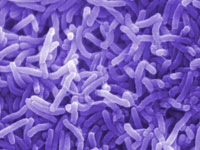 A cholera case was confirmed on New Providence, the Ministry of Health announced last night.
A cholera case was confirmed on New Providence, the Ministry of Health announced last night.
The ministry said a patient with cholera-like symptoms was evaluated at Princess Margaret Hospital on October 18 and laboratory tests confirmed cholera on Monday.
“The patient appeared unwell on arrival, was treated for suspected cholera, and has since recovered,” the statement said.
“…The Ministry of Health can confirm that it continues to investigate this matter and that there are no other reported cases of cholera in The Bahamas.
“There are increased rates of cholera in countries around the world. The Ministry of Health continues its heightened surveillance activities and other necessary precautions to identify cases and prevent the transmission of cholera in The Bahamas.”
Minister of Health Dr. Perry Gomez revealed yesterday that the patient was a 23-year-old woman who was pregnant and presented with diarrhea and vomiting.
During the government’s Hurricane Sandy assessment tour in Abaco on Monday, Prime Minister Perry Christie, Dr. Gomez, Environment Minister Kenred Dorsett and other government officials visited the ‘Sand Bank’ shantytown where filth and trash floated atop the subsiding floodwaters.
Christie said the conditions at that shantytown are not safe or sanitary and raise serious health and environmental concerns.
Cholera often occurs in places with poor sanitation and overcrowding. However, cases or cholera are rare in The Bahamas.
“There we saw circumstances where we ought not to have people living, not to mention young people living,” Christie said.
“And it’s been a vexing matter for this country — places like the Mud, Pigeon Pea, Sand Bank (all shantytowns in Abaco) and centers of immigrants who are living in challenged circumstances.
“And I can tell you that there’s every reason in a country like The Bahamas from a public health point of view where we must always be vigilant and always ensure that we are taking the right steps to ensure that people are living the right way. We want to be able to protect everyone who is in this country the right way.”
When asked by Christie how many people live in the Sand Bank area, which is located in Treasure Cay, several residents said “plenty, plenty”.
One woman guessed that about 1,000 people live in that community.
Cholera, which is normally easy to treat and can be prevented, can also be deadly. It is a bacterial infection that is spread through water and food (mainly shellfish). It’s an infection of the small intestine that causes a large amount of watery diarrhea.
This confirmed case comes one year after a case of cholera was confirmed.
A Haitian immigrant, who contracted the infection entered the country on a sloop, according to officials . He was quickly treated and repatriated.
The Ministry of Health last night reminded the public to use clean water, wash hands regularly and otherwise maintain good hygienic practices to prevent cholera from developing and spreading.
By Krystel Rolle
Guardian Staff Reporter
